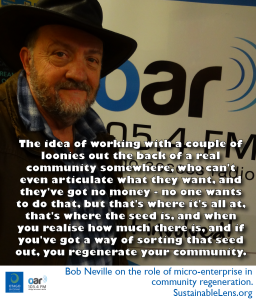(on Regional development chasing big business) That’s very prestigious for an economic development officer. The idea of working with a couple of loonies out the back of a real community somewhere, who can’t even articulate what they want, and they’ve got no money – no one wants to do that, but that’s where it’s all at, that’s where the seed is, and when you realise how much there is, and if you’ve got a way of sorting that seed out, you regenerate your community.
Bob Neville founded Community Regeneration. Bob has extensive experience in Regional and Community/Economic/Social Development with Local Government and Community Development Organisations, with a focus on and passion for small rural communities. He is the author of author of Think BIG…focus SMALL – an introduction to the Natural Science of Small Community Regeneration.
Talking points
Communities are just like gardens.
We’ve become very government dependent, but they don’t have the resources needed
If you are consistently regenerating your backyard garden, it’s going to give back to you. But if you just sit and look at it, it’s going to die – well communities are exactly the same. They are a multiplicity of different people, and services and infrastructure, and when they are established – just like the garden, they need to be continually regenerated at every level.
If the community waits for government to do the regeneration, it won’t happen and as a result the community will start to decline.
Communities are defined by the people that live there – parochial boundaries.
The objective we get a core of people who are interested in and concerned – before it reaches the frog in the saucepan syndrome – people who love their community and want to see it sustained.
There’s a big difference between regeneration and development, we’re not talking about development, we’re talking about sustainable regeneration.
Do you want a way to progress the things you want to do?
Community regeneration is the bridge across the canyon.
Every individual community is totally different – no two are the same.
A process is needed to get past the challenges of community groups.
Of 100 community groups, about five or six were really functioning effectively. The rest were groups by name.
The pace at which you move is determined by the collective capacity of that group.
Ideas are the seed that established every community
Business ideas…exist in a stable community at about a rate of 20 per 1000 population per year…and a similar number for community development projects…but most of those ideas go nowhere – those seeds are not taken seriously and they don’t have a process to take them forward.
The number of ideas is determined by the degree of social challenge already existing in the community.
The one thing that surprises me the most, is not so much the idea, as individuals’ conviction that their idea is unique and uniquely able to work, even if all the evidence points the other way. But as a facilitator you can’t tell them that, they have to see it themselves.
You have to respect people’s ideas and let the mirror try and tell them. They have to make the decision.
Most struggling small communities don’t have the capacity for capacity building.
Fly-by night gurus come in with a cocaine-like fix, they all goes out on a high, but then a couple of days later they’re thinking ‘how the hell are we going to do that?’. Once the fix wears off the community is back where they started. They were made to feel good for a while, but they have no process, no capacity, to make it happen.
Building an inclusive community.
Top down of community is not really thinking of what future will hold.
Debt is OK, but I’m anti continual economic development fuelled by debt
The idea of continual economic development founded on debt is economic disaster.
There has to be a way of doing a business that works
Natural Science of Small Community Regeneration.
It is difficult to get communities to see below the radar – to value micro enterprise.
(on Regional development chasing big business) That’s very prestigious for an economic development officer. The idea of working with a couple of loonies out the back of a real community somewhere, who can’t even articulate what they want, and they’ve got no money – no one wants to do that, but that’s where it’s all at, that’s where the seed is, and when you realise how much there is, and if you’ve got a way of sorting that seed out, you regenerate your community.
We’re only at the beginning of this industry. Those communities that capture this vision and come on board now, will become pioneers in this industry.
(Motivation?) I’ve got a passion for what I’m doing, that developed into a obsession, now it’s tempered back to a passionate obsession.
(Activist?) No, I’m a thinker and a doer.
(Challenges?) People accepting new ideas.
(Miracle?) For individuals to realise that they are responsible for destiny of their own lives, their own families, and their own community. And they need to be regenerating their patch, whatever it is.
Identify what piece of the puzzle you can fill.
(Advice?) Remember New Zealand and Australia are the best countries in the world.
Life is not about what you can get, life isn’t about accumulating things and wealth, it’s about fulfilling that seed that’s inside you that is trying to get out.
Find that seed that is within you and let it grow.

